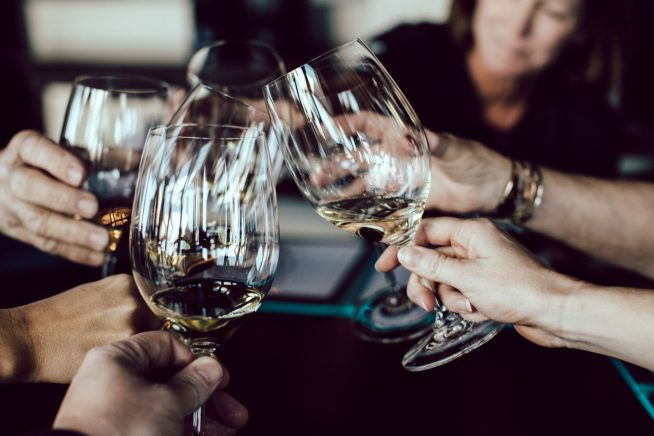Beers at the bar after work. Wining and dining clients. Networking over cocktails. Alcohol can seem such a huge part of our work lives. What happens if you want to quit drinking, or take a break from booze?
Can you be sober without it affecting your chances of success at work?
This is something I used to worry about a lot.
I spent my twenties burning the candle at both ends. I was a journalist in a busy, stressful newsroom, where I worked hard and partied harder. Going out for drinks after work was just what you did. Everyone went. It was how you built relationships and let off steam after a tough day.
Yet, behind the scenes, all wasn’t well. I was drinking too much, and I knew my relationship with alcohol was unhealthy. Something needed to change.
The hangovers were getting worse and I never seemed to have an off switch – once I started, I just couldn’t stop. But the idea of quitting felt terrifying. I was convinced that drinking helped me fit in and bond with my team. So often, getting ahead at work seemed to be about knowing and befriending the right people.
I have friends working in other industries who feel this, too. For some of them, wining and dining clients is actually part of their job – it’s how they win contracts.
So, is it possible to quit drinking and still succeed at work? Here’s what I’ve learned since I got sober five years ago.
“Going out for drinks” is never just about the alcohol
What I failed to realize as a drinker is that no event is purely about booze. We go out for drinks because we want to connect with other humans. We want an excuse to chat and get to know people better.
Once you get clear on the real reason behind those boozy events, the content of your glass starts to feel much less important.
Most people won’t actually notice what you’re drinking
When I first quit drinking, I expected everyone to immediately ask awkward questions about it. But to my surprise, I found people to be far less observant than you might expect!
In early sobriety, I’d recommend choosing a drink that doesn’t scream ‘alcohol free’ – it helps you feel less self-conscious. Nowadays, most bars have a good selection of non-alcoholic cocktails which look just like the real thing.
I’ve been to many a networking event where I’ve spent the evening clutching a club soda with ice and lemon, and people have just assumed it’s a gin and tonic. This gave me the confidence to work the room just like I would if I were drinking.
Drinking less helps you be more professional
When you mix alcohol and work together, you need to be careful. I still cringe at the memory of a work party where I started drunkenly kissing a guy from my department, right in front of my boss.
Shortly afterwards, I was interviewed for a promotion I thought I was destined for – but I didn’t get it. Was that just a coincidence? I guess I’ll never know.
Drinking can lull you into a false sense of closeness, but that doesn’t last in the long term. I’ve found that going out for coffee with co-workers or taking an exercise class together at lunch is a far better way of creating lasting connections.
With clients, shorter alcohol-free lunches are easier than longer, boozy evening meals. Not only does it take less time, but you’re far more likely to focus on the matters you need to discuss (and you can follow everything up with a quick email before the working day is done.)
Socializing sober isn’t as scary as you think
Here’s the thing: most of us are experts at socializing sober – we just don’t realize it! We chat with strangers in business meetings, catch up with friends over coffee and talk to people in our yoga class.
Don’t fall into the trap of thinking you can only be sociable with a glass of wine in your hand. You’ll be amazed at what you can do sober. I never thought I’d be able to give speeches, network with strangers, dance or sing at karaoke without a drink first. But sometimes you surprise yourself!
Alcohol-free living gives you crucial clarity
We spend a lot of our lives at work. If you’re wishing away the hours, counting down until you can hit the bar, then sobriety might deliver a bit of a wake-up call.
For me, ditching alcohol helped me realize that I was actually bored and burned out at work. Drinking had become a highlight of my day simply because I was no longer enjoying the other aspects of my job.
Sobriety will give you an edge over everyone else
Ultimately, getting ahead at work is about doing your job well and a hangover makes that very hard. Sober, you’re far more productive and motivated – your chances of winning that next contract or promotion are far higher.
 Kate Bee is the founder of The Sober School, where she coaches women through early sobriety and helps them navigate alcohol-free living without feeling deprived or miserable.
Kate Bee is the founder of The Sober School, where she coaches women through early sobriety and helps them navigate alcohol-free living without feeling deprived or miserable.
Image courtesy of Scott Warman.












